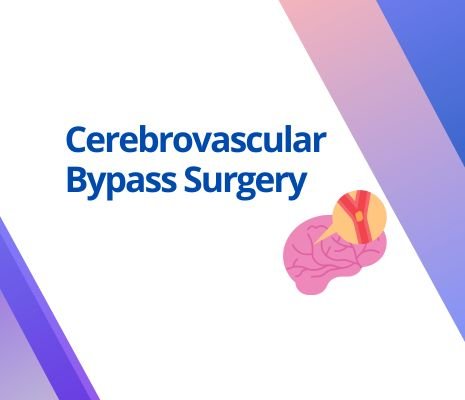Cerebrovascular Bypass Surgery:
Our brain works like the control center of the body. To stay healthy and active, it needs a constant supply of oxygen-rich blood. If this blood flow is blocked or reduced, brain cells can get damaged, leading to strokes or other serious problems.
In certain rare and complex situations, doctors may recommend a procedure called cerebrovascular bypass surgery. This surgery is highly specialized and is done by expert brain surgeons to restore proper blood circulation to the brain.
What is Cerebrovascular Bypass Surgery?
Think of it like road traffic. If the main road is blocked, vehicles need a new path to reach their destination. Similarly, in this surgery, doctors create a new “route” for blood to reach the brain.
They usually take a blood vessel from outside the skull (like one from the scalp) and connect it to a blood vessel inside the brain. This allows blood to “bypass” the blockage and reach the brain tissue safely.
When is it Done?
This surgery is not common, but it can be life-saving in certain conditions:
- Brain Aneurysm – A weak, balloon-like bulge in a brain artery that is risky to treat with regular methods.
- Brain Tumor – If a tumor is pressing on or involving major blood vessels, bypass helps maintain blood supply during tumor removal.
- Moyamoya Disease – A rare disease where brain arteries slowly become narrow, leading to strokes or mini-strokes.
- Blocked Arteries in the Brain – In some patients with severe blockages, bypass can improve circulation.
Types of Bypasses
- Low-flow bypass – Uses a smaller vessel (usually from the scalp) for mild blood flow needs.
- High-flow bypass – Uses a larger blood vessel (often from the arm or leg) for major blood supply.
Success Rate
The success of cerebrovascular bypass depends on the patient’s condition, age, and overall health. Studies show that in experienced centers, the surgery has a success rate of 85–95%, meaning most patients benefit from improved blood flow and reduced stroke risk. However, the surgery also carries slight risks like stroke, seizures, or infection, so it is advised only when necessary.
Recovery After Surgery
- Patients usually stay in the hospital for about a week.
- The first few days are spent in intensive monitoring.
- Some may need physiotherapy, speech therapy, or rehabilitation depending on their condition.
- Most patients can return to normal activities gradually in a few weeks, though recovery may be longer if surgery was done after a stroke.
Cerebrovascular bypass surgery may sound scary, but for certain patients, it can be a lifesaving procedure. Just like a new road helps traffic move smoothly, this surgery gives the brain a fresh blood supply, protecting it from damage.
If your neurosurgeon suggests this surgery, don’t panic—ask questions, understand the risks and benefits, and make sure the procedure is being done at a hospital with experienced neurosurgeons.















